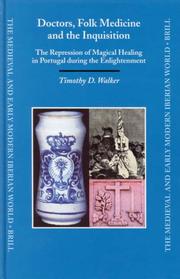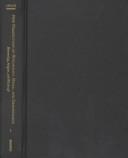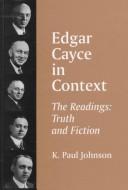| Listing 1 - 10 of 10 |
Sort by
|

ISBN: 9004143459 9786610867998 142945296X 9047407342 128086799X 1433706423 9781429452960 9789004143456 9781433706424 9789004143456 6610867992 9789047407348 Year: 2005 Volume: 23 Publisher: Leiden Brill
Abstract | Keywords | Export | Availability | Bookmark
 Loading...
Loading...Choose an application
- Reference Manager
- EndNote
- RefWorks (Direct export to RefWorks)
Inquisition trials for sorcery and witchcraft in Portugal reached a late crescindo (1715 to 1755). This study of those events focuses on the Inquisition's role in prosecuting and discrediting popular healers (called saludadores or curandeiros), who were charged with practicing magical crimes. Significantly, these trials coincide with the entrance of university-trained physicians and surgeons into the paid ranks of the Portuguese Inquisition in unprecedented numbers. State-licensed medical practitioners, motivated by professional competition combined with a desire to promote rationalized "scientific" medicine, used their positions within the Holy Office to initiate trials against purveyors of superstitious folk remedies. The repression of folk healing reveals a conflict between learned medical culture and popular healing culture in Enlightenment-era Portugal. In this rare instance, the Inquisition functioned as an instrument of progressive social change.
Enlightenment --- Inquisition --- Medicine, Magic, mystic, and spagiric --- Witchcraft --- History --- History of Southern Europe --- Esoteric sciences --- anno 1700-1799 --- Portugal --- Magic --- Black art (Witchcraft) --- Sorcery --- Occultism --- Wicca --- Magic medicine --- Medicine, Mystic --- Medicine, Occult --- Medicine, Spagiric --- Mystic medicine --- Occult medicine --- Spagiric medicine --- Spagyric medicine --- Alchemy --- Alternative medicine --- Superstition --- Aufklärung --- Eighteenth century --- Philosophy, Modern --- Rationalism --- history.
Book
ISBN: 0814343252 0814343244 Year: 2017 Publisher: Wayne State University Press
Abstract | Keywords | Export | Availability | Bookmark
 Loading...
Loading...Choose an application
- Reference Manager
- EndNote
- RefWorks (Direct export to RefWorks)
Without Bounds illuminates the life of the mysterious Rabbi Ya'aqov Wazana, a Jewish healer who worked in the Western High Atlas region in southern Morocco and died there in the early 1950s. Impressed by his healing powers and shamanic virtuosity, Moroccan Jews are intrigued by his lifestyle and contacts with the Muslim and the demonic worlds that dangerously blurred his Jewish identity. Based on interviews with Moroccan Jews conducted in the late 1980s, Without Bounds proposes multiple readings of Wazana's life. Yoram Bilu re-creates the influences and important moments in Wazana's life and evaluates his character from psychological and anthropological perspectives. Human- and demon-bound, holy and impure, Jew and Muslim, old and young, Rabbi Ya'aqov Wazana dissolved the boundaries of the major social categories in Morocco and integrated them into his identity.
Wazana, Yáacov. --- Ṿazanah, Yaʻaḳov --- Wazana, Ya'aqov --- ואזנה, יעקב --- Medicine, Popular. --- Medicine, Magic, mystic, and spagiric --- Rabbis --- Magic medicine --- Medicine, Mystic --- Medicine, Occult --- Medicine, Spagiric --- Mystic medicine --- Occult medicine --- Spagiric medicine --- Spagyric medicine --- Alchemy --- Alternative medicine --- Magic --- Superstition --- Medicine --- Biography: religious & spiritual

ISBN: 0815336683 0815336691 0815336713 0815336721 081533673X 0815336748 0815336705 9781136539329 1136539328 9780815336686 9780815336693 9780815336716 9780815336723 9780815336730 9780815336747 9780815336709 1283713845 0203055845 9780203055816 9781136538483 9781136538551 9781136538629 9780203055830 9781136539046 9781136539114 9781136539183 9780203055847 1136539395 Year: 2001 Publisher: New York Routledge
Abstract | Keywords | Export | Availability | Bookmark
 Loading...
Loading...Choose an application
- Reference Manager
- EndNote
- RefWorks (Direct export to RefWorks)
Witchcraft and magical beliefs have captivated historians and artists for millennia, and stimulated an extraordinary amount of research among scholars in a wide range of disciplines. This new collection, from the editor of the highly acclaimed 1992 set, Articles on Witchcraft, Magic, and Demonology, extends the earlier volumes by bringing together the most important articles of the past twenty years and covering the profound changes in scholarly perspective over the past two decades. Featuring thematically organized papers from a broad spectrum of publications, the volumes in
Witchcraft --- History. --- Medicine, Magic, mystic, and spagiric. --- Traditional medicine. --- Ethnic medicine --- Ethnomedicine --- Folk medicine --- Home cures --- Home medicine --- Home remedies --- Indigenous medicine --- Medical folklore --- Medicine, Primitive --- Primitive medicine --- Surgery, Primitive --- Alternative medicine --- Folklore --- Medical anthropology --- Ethnopharmacology --- Magic medicine --- Medicine, Mystic --- Medicine, Occult --- Medicine, Spagiric --- Mystic medicine --- Occult medicine --- Spagiric medicine --- Spagyric medicine --- Alchemy --- Magic --- Superstition
Book
ISBN: 1283868296 0252094468 9780252094460 0252037294 9780252037290 9781283868297 9780252078767 0252078764 Year: 2013 Publisher: Urbana [Ill.] : University of Illinois Press,
Abstract | Keywords | Export | Availability | Bookmark
 Loading...
Loading...Choose an application
- Reference Manager
- EndNote
- RefWorks (Direct export to RefWorks)
Katrina Hazzard-Donald explores African Americans' experience and practice of the herbal, healing folk belief tradition known as Hoodoo. Working against conventional scholarship, Hazzard-Donald argues that Hoodoo emerged first in three distinct regions she calls oregional Hoodoo clusters - and that after the turn of the 19th century, Hoodoo took on a national rather than regional profile.
African Americans --- Medicine, Magic, mystic, and spagiric --- African American magic. --- Vodou --- Hoodoo (Cult) --- Magic medicine --- Medicine, Mystic --- Medicine, Occult --- Medicine, Spagiric --- Mystic medicine --- Occult medicine --- Spagiric medicine --- Spagyric medicine --- Alchemy --- Alternative medicine --- Magic --- Superstition --- Magic, African American --- Vaudou --- Vodun --- Voodoo (Religion) --- Voodooism --- Voodou --- Vooduism --- Voudon --- Voudooism --- Voudouism --- Voudoun --- Vudu --- Cults --- Folklore. --- Religion.

ISBN: 0585092249 9780585092249 0791439054 0791439062 9780791439050 9780791439067 Year: 1998 Publisher: Albany, N.Y. State University of New York Press
Abstract | Keywords | Export | Availability | Bookmark
 Loading...
Loading...Choose an application
- Reference Manager
- EndNote
- RefWorks (Direct export to RefWorks)
Parapsychology. --- Clairvoyance. --- Medicine, Magic, mystic, and spagiric. --- Magic medicine --- Medicine, Mystic --- Medicine, Occult --- Medicine, Spagiric --- Mystic medicine --- Occult medicine --- Spagiric medicine --- Spagyric medicine --- Alchemy --- Alternative medicine --- Magic --- Superstition --- Extrasensory perception --- Metaphysics (Parapsychology) --- Paranormal phenomena --- Parapsychology --- Psi (Parapsychology) --- Psychic phenomena --- Psychical research --- Psychology --- Occultism --- Cayce, Edgar, --- Keishī, Edogā,
Book
ISBN: 8021087722 9788021087729 9788021087729 Year: 2016 Publisher: Brno, [Czech Republic] : Masarykova univerzita,
Abstract | Keywords | Export | Availability | Bookmark
 Loading...
Loading...Choose an application
- Reference Manager
- EndNote
- RefWorks (Direct export to RefWorks)
Traditional medicine --- Medicine, Magic, mystic, and spagiric --- Women healers --- Curanderas --- Healers --- Women in medicine --- Magic medicine --- Medicine, Mystic --- Medicine, Occult --- Medicine, Spagiric --- Mystic medicine --- Occult medicine --- Spagiric medicine --- Spagyric medicine --- Alchemy --- Alternative medicine --- Magic --- Superstition --- Ethnic medicine --- Ethnomedicine --- Folk medicine --- Home cures --- Home medicine --- Home remedies --- Indigenous medicine --- Medical folklore --- Medicine, Primitive --- Primitive medicine --- Surgery, Primitive --- Folklore --- Medical anthropology --- Ethnopharmacology
Book
ISBN: 3906897271 3906897273 Year: 2018 Publisher: LIBRUM Publishers & Editors LLC
Abstract | Keywords | Export | Availability | Bookmark
 Loading...
Loading...Choose an application
- Reference Manager
- EndNote
- RefWorks (Direct export to RefWorks)
Cagliostros Tun war privilegiertes Thema der aufkeimenden Massenmedien der Aufklärung. Als historischer Akteur hat der Arzt und Alchemist wenig Kontur. Die Urteile schwanken zwischen Scharlatan und Prophet. Dass er eigene Arzneien hatte, ist bekannt. Die wenigen veröffentlichten Rezepte werden in der Pharmaziegeschichte als Inbegriff für Geheimmittel gehandelt – das waren Eigenpräparate bekannter Ärzte. Von einer Rezeptsammlung, die im Basler Staatsarchiv aufbewahrt wird, konnten etliche Stücke Cagliostro zugeschrieben werden. Diese Formeln ermöglichen es, von seiner Pharmakopöe zu sprechen und sie der pharmaziehistorischen Analyse zu unterziehen. 13 Rezepte sind hier ediert. Ihre Bewertung kann dazu beitragen, ein differenzierteres Bild einer der umstrittensten Figuren der europäischen Geschichte zu zeichnen.
Alchemie --- Pharmazie --- pharmacy --- alchemy --- Occultists --- Medicine, Magic, mystic, and spagiric --- Alchemy. --- Cagliostro, Alessandro, --- Metals, Transmutation of --- Philosophers' egg --- Philosophers' stone --- Stone, Philosophers' --- Transmutation of metals --- Chemistry --- Occultism --- Magic medicine --- Medicine, Mystic --- Medicine, Occult --- Medicine, Spagiric --- Mystic medicine --- Occult medicine --- Spagiric medicine --- Spagyric medicine --- Alchemy --- Alternative medicine --- Magic --- Superstition --- Balsamo, Giuseppe, --- Balsamo, Joseph, --- Balʹzamo, Iosif, --- Gran Cofto, --- Kaliostro, --- Kalliostro,
Book
ISBN: 1282191098 9786612191091 1443807338 9781443807333 9781282191099 9781443804943 1443804940 Year: 2009 Publisher: Newcastle upon Tyne, U.K. : Cambridge Scholars Pub.,
Abstract | Keywords | Export | Availability | Bookmark
 Loading...
Loading...Choose an application
- Reference Manager
- EndNote
- RefWorks (Direct export to RefWorks)
'The Apothecary's Chest: Magic, Art and Medication' was a one-day symposium held at the University of Glasgow on November 24, 2007. The symposium called for a discussion on the evolution of the notions of mysticism, knowledge and superstition in the way t
Pharmacology --- Medicine, Magic, mystic, and spagiric --- Medicine and art --- Literature and medicine --- Healing --- Curing (Medicine) --- Therapeutics --- Medicine and literature --- Medicine --- Art and medicine --- Art --- Art and science --- Anatomy, Artistic --- Medical illustration --- Magic medicine --- Medicine, Mystic --- Medicine, Occult --- Medicine, Spagiric --- Mystic medicine --- Occult medicine --- Spagiric medicine --- Spagyric medicine --- Alchemy --- Alternative medicine --- Magic --- Superstition --- Drug effects --- Medical pharmacology --- Medical sciences --- Chemicals --- Chemotherapy --- Drugs --- Pharmacy --- History --- Physiological effect
Book
ISBN: 1469606399 0807878049 9780807878040 9781469606392 9780807834497 0807834491 9781469609751 1469609754 9798890840011 Year: 2011 Publisher: Chapel Hill University of North Carolina Press
Abstract | Keywords | Export | Availability | Bookmark
 Loading...
Loading...Choose an application
- Reference Manager
- EndNote
- RefWorks (Direct export to RefWorks)
Between 1730 and 1750, Domingos Alvares traversed the colonial Atlantic world like few Africans of his time--from Africa to South America to Europe. By tracing the steps of this powerful African healer and vodun priest, James Sweet finds dramatic means for unfolding a history of the eighteenth-century Atlantic world in which healing, religion, kinship, and political subversion were intimately connected.Alvares treated many people across the Atlantic, yet healing was rarely a simple matter of remedying illness and disease. Through the language of health and healing, Alvares also address
Vodou. --- Witchcraft. --- Medicine, Magic, mystic, and spagiric. --- Inquisition --- Slave-trade --- Healers --- Slaves --- Black art (Witchcraft) --- Sorcery --- Occultism --- Wicca --- Magic medicine --- Medicine, Mystic --- Medicine, Occult --- Medicine, Spagiric --- Mystic medicine --- Occult medicine --- Spagiric medicine --- Spagyric medicine --- Alchemy --- Alternative medicine --- Magic --- Superstition --- Holy Office --- Autos-da-fé --- Curanderos --- Faith healers --- Mental healers --- Psychic healers --- Spiritual healers --- Traditional healers --- Healing --- Mental healing --- Spiritual healing --- Enslaved persons --- Persons --- Slavery --- Vaudou --- Vodun --- Voodoo (Religion) --- Voodooism --- Voodou --- Vooduism --- Voudon --- Voudooism --- Voudouism --- Voudoun --- Vudu --- Cults --- History --- Álvares, Domingos, --- Atlantic Ocean Region --- Atlantic Area --- Atlantic Region --- Slave trade --- Voodooism.
Book

ISBN: 9782713221675 2713221676 2713231469 Year: 2019 Volume: 27 Publisher: Paris : Éditions de l’École des hautes études en sciences sociales,
Abstract | Keywords | Export | Availability | Bookmark
 Loading...
Loading...Choose an application
- Reference Manager
- EndNote
- RefWorks (Direct export to RefWorks)
L’abondance des sources qu’offre l’Asie du Sud - à la fois textuelles, historiques et ethnographiques - au croisement et à l’interaction du médical et du religieux, rend difficile l’analyse que ce volume se propose d’accomplir. En fait, la porosité des frontières entre les domaines nous oblige à questionner les outils mêmes de notre enquête. Si l’objectif est de focaliser l’attention sur les recoupements entre soins et cultes, remèdes et rituels, thérapeutes et officiants, le risque encouru est celui de dissoudre et de confondre les deux domaines, en traitant tout acte thérapeutique de religieux, et tout acte religieux de thérapeutique. Ce gommage ferait disparaître la raison d’être de ce volume, qui consiste à étudier les articulations, les jointures, et parfois les frictions, entre le médical et le religieux. Toutefois, une définition des termes « médecine » et « religion » n’entre pas dans le propos de cet ouvrage. La notion abstraite de « religion » est une construction conceptuelle récente, liée à l’émergence des États modernes et à l’expansion européenne, et n’a pas d’équivalent dans la plupart des langues indiennes, de même que le terme « médecine » rend difficilement compte de l’hétérogénéité des savoirs et des pratiques thérapeutiques que l’on rencontre dans le monde indien. Les contributions ici réunies, sans donner une définition univoque des champs du religieux et du médical, accordent une importance majeure aux concepts et aux terminologies locales montrant ainsi la pluralité des formes à travers lesquelles les représentations cosmologiques, rituelles et divines sont reliées aux théories et aux pratiques de santé.
Medicine, Magic, mystic, and spagiric --- Healing --- Spiritual healing --- Traditional medicine --- Médecine magique, mystique et spagirique --- Guérison --- Guérison par la foi --- Médecine traditionnelle --- Religious aspects. --- Aspect religieux --- Religious aspects --- Médecine magique, mystique et spagirique --- Guérison --- Guérison par la foi --- Médecine traditionnelle --- South Asian studies --- Medicine and religion --- Ethnic medicine --- Ethnomedicine --- Folk medicine --- Home cures --- Home medicine --- Home remedies --- Indigenous medicine --- Medical folklore --- Medicine, Primitive --- Primitive medicine --- Surgery, Primitive --- Alternative medicine --- Folklore --- Medical anthropology --- Ethnopharmacology --- Divine healing --- Faith-cure --- Faith healing --- Spiritual therapies --- Miracles --- Curing (Medicine) --- Therapeutics --- Magic medicine --- Medicine, Mystic --- Medicine, Occult --- Medicine, Spagiric --- Mystic medicine --- Occult medicine --- Spagiric medicine --- Spagyric medicine --- Alchemy --- Magic --- Superstition --- Medicine, Magic, mystic, and spagiric - South Asia --- Healing - South Asia - Religious aspects --- Spiritual healing - South Asia --- Traditional medicine - South Asia --- medicine --- religion --- ritual --- healing --- superstition --- therapeutic practice
| Listing 1 - 10 of 10 |
Sort by
|

 Search
Search Feedback
Feedback About UniCat
About UniCat  Help
Help News
News